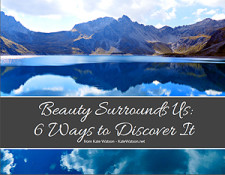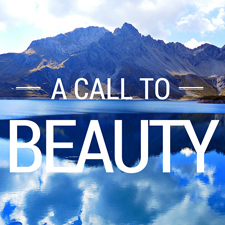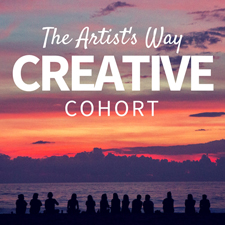
Recently, one of my Playing Big sisters introduced me to Herb & Dorothy, an award-winning and beautiful film about art collectors Herbert and Dorothy Vogel, by filmmaker Megumi Sasaki. The Vogels acquired a large and prestigious collection of minimalist and conceptual art, using just their modest salaries as a postal worker and librarian. They had only two rules when it came to collecting:
- The art had to be affordable for them, and
- The art had to fit in their one-bedroom Manhattan apartment.
And maybe one more: They had to like it! Throughout their marriage, the couple collected more than 4,000 works of art, including paintings, objects, drawings, photographs, prints and illustrated books. In 1992, when the collection numbered approximately 2,400 works, the National Gallery of Art agreed to provide it a permanent home. However, as the collection continued to grow, NGA realized even it could not house all of the Vogel’s collection, so a new project was born, one Megumi Sasaki seeks to share in a follow-up film to be called Herb & Dorothy 50×50.
Megumi is actively seeking funding to complete the film, which is already three years in the making. I love the original film and am passionate about helping her reach her goal of raising $55,000 by November 5th.
She was kind enough to take some time to chat with me about the Vogels, art, passion and filmmaking. Here is our interview:

Megumi Sasaki. Photo credit: Yu Nakajima
What first drew you to telling Herb & Dorothy Vogel’s story?
I first heard about Herbert & Dorothy in February 2002. I was working as a field producer for Japanese public television, NHK. We were at the National Gallery in Washington, DC, shooting an exhibition for artists Christo and Jeanne-Claude and all the works exhibited were part of Herb & Dorothy’s collection. I was so moved by their story and was hoping to do something about it. Two years later, I happened to meet them in person and everything grew from there.
What moved you about their story?
I was moved by the story of their passion and love for art, but not just that. Their story is about how we live, it’s about life. Money and social status, jobs, fame… all of that doesn’t really matter if you have true passion and love, which I think is the essence of Herb & Dorothy’s story.
You’ve been quoted as saying, “The story is about a triumph of passion and love that can turn the impossible possible.” How does that relate to your own story?
I never imagined I would make a feature-length documentary with such an impact; it reached so many people globally. That’s part of the power of passion. I was so moved and so passionate to tell their story, that passion gave me absolute power to accomplish something that I never imagined I could.
And how was it that you came to produce and direct the first film, when you hadn’t done something like that before? You said your passion was driving you but how did that translate into action.
It was a gradual process. I think action is the most important thing, but we tend to think, try to figure out what to do, how to be perfect… I’d rather jump in and start making progress. That might have helped me because Herb and Dorothy told me later that many experienced filmmakers had approached them, wanting to make a film and they’d never said, “No,” to anybody, and the filmmakers would say, “Great, we’ll come back when we raise the money,” and then nobody came back. In my case, I didn’t really know that I needed to fundraise before making the film and that ignorance really helped me to take action.
As you move on and take more and more action, you start seeing things more clearly instead of sitting and trying to figure it all out from a desk. It was a gradual process. And the project kept growing bigger and bigger. It’s not like, one day at one moment, the project became a big one. Rather, it organically kept growing.
I’ve heard other successful people say the same thing. There can be a paralysis of analysis when you start a project, but it seems that the people who jump in accomplish so much more and learn what they need to as they go along.
Yes, but I wouldn’t necessarily recommend that to everyone. I wish I was a little more knowledgeable and prepared before I jumped in, but in the case of Herb & Dorothy (the first film), it worked out. With my second film, I’m a little more careful.
Tell me about your follow-up documentary.
Herb & Dorothy 50×50 shares the final chapter of the Vogel’s lives and what happens to their collection. In contrast to their original wish to keep the collection together physically, the collection grew too large to be handled by any one museum, even by the National Gallery of Art, so the collection has to be broken down. It will be kept together conceptually, however, under the project entitled “The Dorothy and Herbert Vogel Collection: Fifty Works for Fifty States.” My follow-up film will talk about the gift project, and will be more deeply looking into their art collection and the reaction of the art communities who receive their gift.
So, basically, this film is important because it’s telling the final chapter of the story you started in Herb & Dorothy?
That’s correct.
How long have you been working on the second film, and what’s the timeline to finish it?
I’ve been working on it since the end of 2008. I’d like to finish it in the early part of next year (2012). Next year is Herbert & Dorothy’s 50th wedding anniversary and Herbie will turn 90 years old, so it’s a big landmark year and I’m so determined to finish the film by then.
You’re currently seeking funds to finish the film. Tell me about how much is needed to bring it to the public and by when, and what you’re doing to solicit funding.
We launched a Kickstarter campaign September 6th for 60 days to raise $55,000. At this point, we are a little past 50% funded and we are getting a bit nervous, but we’re doing everything we can to reach the goal by November 5th, midnight. We will be having a wrap-up party that evening in New York City and Herb and Dorothy will be there.
What have you learned (about life, art or following your passion) from this process, or from the Vogels themselves?
I have learned so many things. I’ve learned about contemporary art, particularly minimal and conceptual art, which wasn’t an interest of mine before I started this project.
I think the most important life lesson I learned is about passion and love. Those are the two most important things in our life. No matter how rich or important or famous you are, it doesn’t mean much without love and passion.
Also, in terms of the creative process, the most important lesson I learned is about limitations. Limitation is good for creativity. We tend to make enemies of problems and obstacles that we stumble into but I’ve found that they can be a very effective tool in being more creative. For example, we have limitations in terms of money, shooting accessibility for interviews, access to archival materials, but when we don’t have the things that we hope to have, I have to work harder and be more creative. I think that, at the end, I’ve learned how to welcome those problems in the process.
I think perseverance is everything. No matter how talented you are, creativity takes time and action. Creative people have to expose themselves and face criticism, possible negative reactions. I had to build up a very thick skin, which was very difficult in the beginning.
It’s easy to give up when you create your own deadline. You have to be your own boss, and keep your motivation and morale high, for yourself and for the team.
* * *
It sounds like Megumi is doing just that! The deadline for contributing to Herb & Dorothy 50×50 is November 5th—11 more days—so please head over to Megumi’s Kickstarter page today and help as much as you can. To learn more about the Vogels, you can also check out their Facebook page or follow them on Twitter. Herb & Dorothy, the first film, is available on Netflix.
Thank you for your help!
![]()

















Interview With Megumi on Art Aligned | Herb & Dorothy - […] we’d like to share a post published over at the heartful Art Aligned, where the wonderful Kate Watson interviews Megumi about HERB & DOROTHY, and about this […]